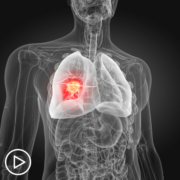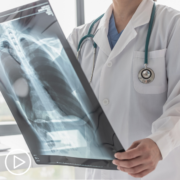Key Questions to Ask About Extensive Stage Small Cell Lung Cancer
Key Questions to Ask About Extensive Stage Small Cell Lung Cancer from Patient Empowerment Network on Vimeo.
What should small cell lung cancer (SCLC) patients ask to help prepare themselves? Dr. Rafael Santana-Davila with the University of Washington School of Medicine shares how he explains small cell lung cancer, particularly extensive stage SCLC to patients and key questions to ask about treatment and care.
[ACT]IVATION TIP
“…you need to talk to your doctors and say, ‘Okay, what am I looking at? What are the goals of treatment? How am I going to feel in the next month? How am I going to feel in the next three months? And where am I going to be in the next six months? And what is my prognosis? And what do you expect to happen?’”
See More from [ACT]IVATED Small Cell Lung Cancer (SCLC)
Related Resources:

|

|

|
Transcript:
Lisa Hatfield:
Dr. Santana-Davila, how do you explain extensive stage small cell lung cancer to your newly diagnosed patients? And what are key questions that patients and families should ask at the outset of their care?
Rafael Santana-Davila:
Oh, great. Thank you. Thank you for that. That is a great question. So patients who have metastatic small cell lung cancer, which is the majority of those with extensive stage, it’s a disease that is not curable, that we treat with chemotherapy and immunotherapy, that the majority of patients have a great response to treatment.
But our goal of treatment is to make patients feel better and have patients hopefully live longer. One of the key questions that families should ask at the outset of care, and this is for extensive stage cancer as well as any other cancer, is “What are the goals of treatment? What do I expect it to be? How is my life going to look a few months from now? And what can I expect?” That is, for me, very important that patients know before they start on the journey of treatment.
How do I explain what extensive stage is? What does it mean…how I explain this to patients is this is a cancer that has arose in your lung and has moved to other places. So we cannot cure it. We can treat it. We can hopefully shrink it and help you to live longer and live better. The majority of patients that present with this disease present with a lot of symptoms. They present with symptoms from the cancer. And many times it’s an emergency to try to treat them as soon as possible.
So this is a conversation that we have with them that we tell them, “It’s very likely that you will feel better, that you’ll respond to treatment.” But again, an activation tip is you need to talk to your doctors and say, “Okay, what am I looking at? What are the goals of treatment? How am I going to feel in the next month? How am I going to feel in the next three months? And where am I going to be in the next six months? And what is my prognosis? And what do you expect to happen?”
Share Your Feedback:
Create your own user feedback survey










